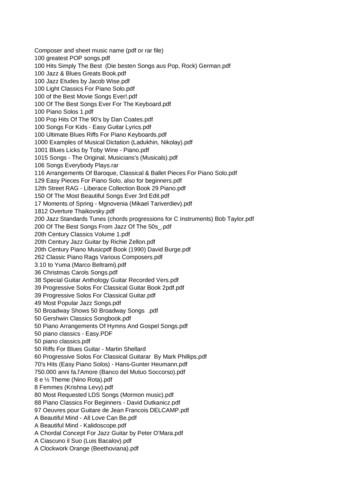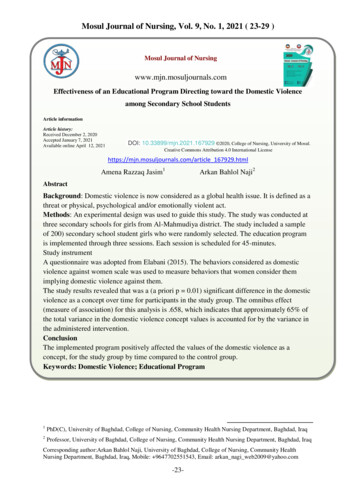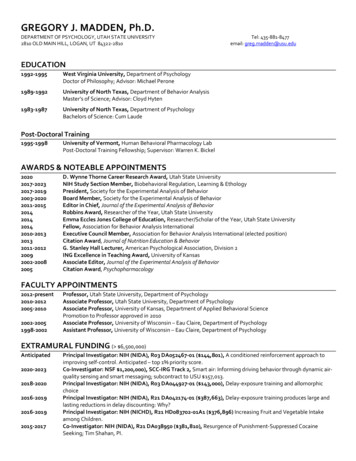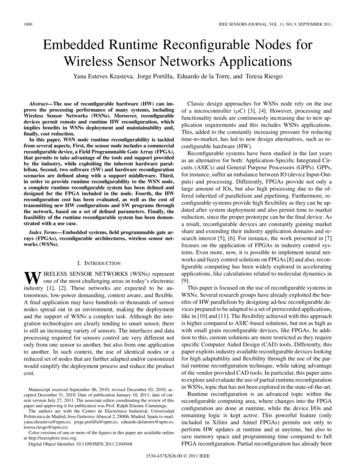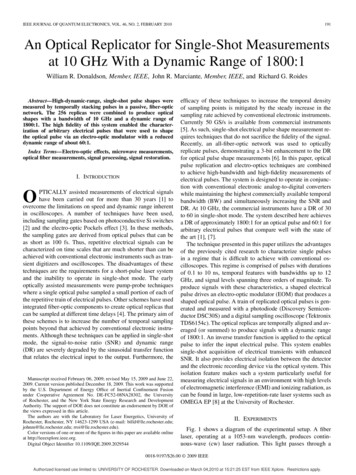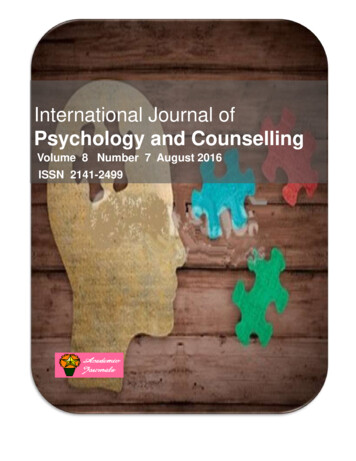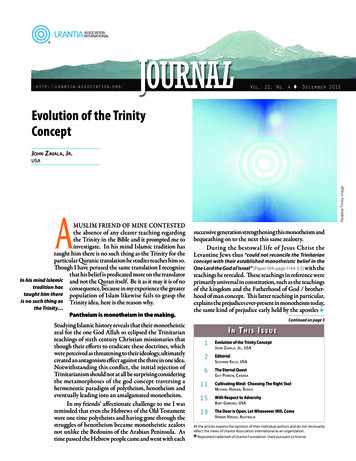
Transcription
ASSOCIATIONINTERNATIONAL http://urantia-association.org/JOURNALVol. 22, No. 4 December 2015Evolution of the TrinityConceptJ ohn Z avala , J r .AMuslim friend of mine contestedthe absence of any clearer teaching regardingthe Trinity in the Bible and it prompted me toinvestigate. In his mind Islamic tradition hastaught him there is no such thing as the Trinity for theparticular Quranic translation he studies teaches him so.Though I have perused the same translation I recognizethat his belief is predicated more on the translatorIn his mind Islamic and not the Quran itself. Be it as it may it is of notradition has consequence, because in my experience the greatertaught him there population of Islam likewise fails to grasp theis no such thing as Trinity idea, here is the reason why.the Trinity Pantheism is monotheism in the making.Studying Islamic history reveals that their monotheisticzeal for the one God Allah so eclipsed the Trinitarianteachings of sixth century Christian missionaries thatthough their efforts to eradicate these doctrines, whichwere perceived as threatening to their ideology, ultimatelycreated an antagonism effect against the three in one idea.Notwithstanding this conflict, the initial rejection ofTrinitarianism should not at all be surprising consideringthe metamorphoses of the god concept traversing ahermeneutic paradigm of polytheism, henotheism andeventually leading into an amalgamated monotheism.In my friends’ affectionate challenge to me I wasreminded that even the Hebrews of the Old Testamentwere one time polytheists and having gone through thestruggles of henotheism became monotheistic zealotsnot unlike the Bedouins of the Arabian Peninsula. Astime passed the Hebrew people came and went with eachParadise Trinity imageUSAsuccessive generation strengthening this monotheism andbequeathing on to the next this same zealotry.During the bestowal life of Jesus Christ theLevantine Jews thus “could not reconcile the Trinitarianconcept with their established monotheistic belief in theOne Lord the God of Israel” [Paper 104: page 1144: 5.5] with theteachings he revealed. These teachings in reference wereprimarily universal in constitution, such as the teachingsof the kingdom and the Fatherhood of God / brotherhood of man concept. This latter teaching in particular,explains the prejudices ever-present in monotheism today,the same kind of prejudice early held by the apostles Continued on page 3I n Th i s I s s u e1Evolution of the Trinity ConceptJ ohn Z avala , J r ., USA2EditorialS uzanne K elly, USA6The Eternal QuestG uy P erron , C anada11Cultivating Mind: Choosing The Right ToolM ichael H anian , R ussia15With Respect to AdversityB art G ibbons , USA19The Door is Open, Let Whosoever Will, ComeV erner V erass , A ustraliaAll the articles express the opinions of their individual authors and do not necessarilyreflect the views of Urantia Association International as an organization. Registered trademark of Urantia Foundation. Used pursuant to license.
Journal Vol 22, No 4 December 2015Urantia AssociationInternationalJOURNALEDITORIAL2Journal TeamChief Editorial & Translation Coordinator:Suzanne Kellyskelly@wtmi.netChief French Translation Coordinator:Alain Cyralain cyr@sympatico.caGreetings fellow Journal readers,In this Edit ion of theJournal for 2015/2016 we havefive remarkable articles on theperspectives of faith to assist usin rounding out 2015 and begin anew2016 from a global perspective.Our first edifying piece “TheEvolution of the Trinity Concept”is from second time contributorJohn Zavala, Jr., USA. John clearlyoutlines how the idea of the Trinityconcept had such a difficult timebeing understood and accepted bythe Muslim belief system in the pastand today. A conversation with hisfriend initiated this illuminatingstudy, and hopefully his words willprovide a little insight and perhapssome reception to this revelation.Studying Islamic history reveals thattheir monotheistic zeal for the oneGod Allah so eclipsed the Trinitarianteachings of 6th century Christianmissionaries that though their effortsto eradicate these doctrines, whichwere perceived as threatening totheir ideology, ultimately created anantagonism effect against the threein one idea.“The Eterna l Quest,” oursecond article is from Guy Perron,Canada. It is an intricate report onhis experience at the sixth WorldParliament of Relig ions held inSalt Lake City Utah in 2015. So,here we are , 10 ,0 0 0 relig ionistsfrom more than 80 countries and50 different faith paths gathered forthis extra-ordinary event, the sixthParliament of World Religions, heldin Salt Lake City, Utah for five days,from October 15 to 19 for. The firstParliament which is now recognizedas the occasion of the birth of formalinterreligious dialogue worldwidewas held in 1893 in Chicago; it wasthe brainchild of the Swedenborgianlayman and judge Charles C. Bonney.Chief Spanish Translation Coordinator:Guy’s recounting of this spiritualconclave should encourage anyonewho can make the trip to get to thenext one. After this experience, isthere within me a feeling that I had aforetaste of the Mansion Worlds? Well,I have never been there but if I reflecton the Parliament and combined it towhat we are told will happen on thefirst two Mansion Worlds where manyphysical and intellectual elements willbe rectified, I would say most likely.Our third contributor, MichaelHanian, Russia, shares with us apresentation he made at the lastUAI conference in 2015 entitled,“Cultivating Mind: Choosing theRight Tool; A personal account offaith as a tool of mind cultivation.”In this presentation Michael recallshis decision to read The UrantiaBook and allow it to bear fruit inhis life. He also discovered whatI feel is one of the most incredible revelations regarding creativity.Being a composer, I found the idea ofcreativity to be the most appealingto me. For creativity is ultimatelycalling into being a new reality. Andthat is something that makes us, ifnot creators, then at least co-creators.In this presentation he awards uswith his living words of faith overfear and—leaves us with words tolive by, it is an essential part of ourdevelopment, both as mortals and ineternity, to build strong character andunshakable faith.Bart Gibbons, USA, is next andin his “With Respect to Adversity”he asks the question a l l of us atone time or another has wanted ananswer to How do the teachings helpus respond when we are shattered bydevastating and unexpected tragedyor our own misguided efforts causessuffering and despair in our dailylives? Bart give us examples on howto deal with just about everythingOlga Lópezolopez65@gmail.comPage L ayout: Verner Verassvern@designd.com.auAdministrative Staff:Margaret Slater al team is currently seeking AssistantEditors, Proofers, and as always, Submissions!Please see back page for Submission Policy.this world can throw at us, oneof my favor ites—a nd one t hatI’ve become familiar with is Goodjudgment comes from experience,and a lot of that comes from badjudgment. Will Rogers. Ok, that onewas from Will Rogers, but secondin line, which totally made my dayis The career of a God-seeking manmay prove to be a great success in thelight of eternity, even though the wholetemporal-life enterprise may appearas an overwhelming failure, providedeach life failure yielded the culture ofwisdom and spirit achievement. [PaperThanks Bart!Our Final article to send youinto 2016 with hope, happiness andfaith, from Australia, is part two ofVerner Verass’ “The Door is Open,Let W hosoever Wi l l, Come.”Beginning with the consummateinvitation he extends his welcome toeach of us to accept the gift of eternallife and the ever increasing capacityfor joy of existence true adventure!Who can say no to the adventure ofeternal life? Utilizing the encouraging words of Jesus, Vern convincesus all to embrace the ticket of faith,that To follow Jesus is to believe notmerely in him but in the father whosent him. The person who sees Jesussees the Father. A promise of life inabundance for “whosoever will.”Suzanne Kellyskelly@wtmi.net n160:4:16, page 1780:2]
Journalcont. from page 1in Jesus’ day. Though having the advantage of researchingThe Urantia Book it isn’t difficult to deduce the fact thatthe Lord went to great lengths to facilitate comprehensionon behalf of them. Being so nurtured in their dominatingconcept of Yahweh the apostles often found themselvesperplexed with the words of the master and defaultedto their philosophic positions of traditions when theycould not reasonably grasp an adequate understanding.Embryonic Christianity inherited the same declinationwhich was inevitably strengthened through the writingsof the New Testament primarily from the pen of Paul.When the Jesusonian evangels therefore penetratedthe desert bringing the story of the risen Christ as thesecond person of a trinity, a concept which according toThe Urantia Book “erred in fact though particularly true withrespect to spiritual relationships” [Paper 104:1 page 1145:1.4]they unknowingly accentuated the evolving God conceptamong proto Islamics. The desert people were living onthe eve of a great day of religious advancement regardingtheir comprehension of deity. This Bedouin communitywas on the latter end of experiencing the time honoredprocess of evolving all of their polytheistic deities into oneunified (theoretical) entity, an experience slowly traversedby the Hebrews previously.In a primitive Religious Society polytheism is aVol 22, No 4 from multiple sources. Again it may be true that Judaicand Christian methods of proselytizing may have been abit austere albeit the social collateral requirements of Zoroastrianism and Mithraism Judeo Christianwere equally as strict. Second, Muhammad’steachings influencedmotivation was aggravated by the fact ofthe birth characterthe inconsistency and incoherency of theof Islam to no smallpolytheistic tendencies of his own people.degree Now here’s the crux. Foreign religiousgroups like Christianity and Mithraism in and bythemselves had a less than moderate influence in the riseof radical Islamic monotheism. So too was the impactof the religious vagrancy of the Bedouins insignificant.In retrospect, today, the aggregate condition thatoverwhelmingly maturated its birth, a condition whichtraumatized the transition process of a fading polytheism(proto Islam) to a sublime monotheism (embryonicIslam). At least, that would have been the normal advanceof things if established religions of the day nurtured,instead of attempting to conform (impose) new spiritualmovements like Islam.relative unification of evolving concept of Deity; polytheismmonotheism in the making [Paper 5 :4.2 page 67:0] it is fromthis broad perspective that explains why my friend conteststhe presence of the Trinity in the Bible. The romanticstruggle of love between man and God as written in theTestaments is a story of a monotheistic betrothal, not astory of a Trinitarian co-op. A narrative about a trinityis relatively absent from the Scriptures albeit I counterthat the presence of the Trinity is revealed through thoseindivisible elements that made monotheism possible.Notwithstanding, the Hebrews did sustain at least avague concept of the Trinity and though the concept neverbecame elaborate in their theology, it began to solidify oncethey deanthropomorphised their monotheism, somethingGiven sufficient time, monotheism will evolve on itsthe Arabian Bedouin never had chance to experience.own when left relatively unmolested or “as a philosophicThe Meccan rejectionSome Islamic theologians teach that it was Jewish theologycoupled with the later arriving Christian teachings thatmade Islam radically monotheistic. I tend to disagreethough it is true that Judeo Christian teachings influencedthe birth character of Islam to no small degree, it is hardlyaccurate to say that the influence thereof was the cause ofIslamic radicalism. Furthermore it would be a far reachto lay the responsibility of Muslim extremism at the feetof a Jew or a Christian!Instead, my research leads me to believe thatMohammad founded the Muslim faith as a philosophicprotest against all the social demands of the day, which,when recalling the sixth century history, were derived3December 2015protest against the inconsistency of polytheism” [Paper 104:2page 1145] as is demonstrated in the experience of the OldTestament peoples. To glean from their experience theirhermeneutic traversal from polytheism to monotheism wasa gradual conceptual development, being sustained fromtime to time by the patriotic revivals by those devoted toYahweh “the one God of final and supreme value The LordGod of Israel.” [Paper 96.1, page 1052].Nevertheless, passing the monotheistic torch fromgeneration to generation wasn’t all a smooth run. Theprogress of the Hebraic concept was constantly inhibited,and thus retrogressed at times by inevitable repercussionsdo to cultural and tribal impingement. One such impingement was the idea of the jealous God. Indeed, Moses mayhave taught this but “No prophet or religious teacher fromThe Urantia Book is the third presentation of the Trinity to mankindEvolution of the Trinity Concept
4Journal Vol 22, No 4 December 2015long stretch of time, monotheism slowly solidified inthe Hebraic mind and through consecutive eras theirlesser ideas of deity were henotheistically subordinatedthe fact that God is all powerful, a loving father, a God to a greater concept. The Hebrews, beginning with thefamily of Abraham, “long believed in the existence of otherof all the peoples.It is observable that when two cultures begin to gods other than Yahweh, but they increasingly held thatintermix, whether by political imaginations or religious these foreign deities were subordinate to Yahweh.” [Paperones, the less evolved can assimilate only so much from the 96:1 page 1054.4.2].greater, even if the greater presents their knowledge readyIt was all but inevitable that, as the Hebrewsmade for them. Accordingly, the depths of assimilation advanced in culture, the evolution of their way of life andby the lessor can be measured by that “ which religious viewpoints “ demanded a more or less completeMachiventa to the time of Jesus attained the high conceptof God that Isaiah the second who proclaimed during thosedays of captivity” [Paper 97:5, page 1068] and who punctuatedHad the birthing of theIslamic concept of Allahbeen given enough timeto develop in the heartsof the Mohammedans,the preaching of JesusChrist as a second personand Deity wouldn’t havebeen such a direct threatto the Muslim faith.is reasonably consistent and compatible with its change in the character of their monotheistic conception ofcurrent evolutionary status, plus it’s genius for the nature of their God, Yahweh.” [Paper 96:6 page 1059:2.4] .adaptation.” [Paper 92:2.5 page 105] Suffice it to Furthermore as their monotheistic comprehension becamesay the proto Islamic culture, though ready tousher in a glorious monotheistic era did so; yetbecause of the unusual number of attributingfactors, including the absence of any kind ofspiritual fostering by the more mature religions,the new concept of one God was susceptible tothe frailties of new faith. Had the birthing ofthe Islamic concept of Allah been given enoughtime to develop in the hearts of the Mohammedans, thepreaching of Jesus Christ as a second person of Deitywouldn’t have been such a direct threat to the Muslimfaith. The Meccan rejection wasn’t against the Lord perse, but in the infantile Islamic mind it was against the ideaof one God, who was, as it were, jealous.In as much as monotheism arises as a protest againstthe inconsistency of polytheism, an inevitable repercussionof its normal evolutionary development, Trinitarianismlikewise develops out of “the impossibility of concevingthe oneness of a deanthropomorphized solitary Deity ofunrelated unervise significance.“ [Paper 104:2 page 1145:3.2]Notwithstanding, Trinitarianism never had a chance inthe days of Mohammed for reasons as discussed. To sumup then, the Mohammedans just could not reconcile theirnew monotheistic concept manifesting in three channelsof eternal nature in contradistinction from distinguishingthree gods as one. “It is always difficult for an emergingmonotheism to tolerate Trinitarianism when confrontedby Polytheism ” [Paper 104: page 1144: 5.5] The Urantia Booksuggests that the Trinity idea best takes hold when thereis a firm monotheistic tradition coupled with some degreeof doctrinal elasticity as seen in the birth of Christianity,and this, within the Hebraic realms of Judaism. To besure, let us briefly recount the evolution of the god conceptamong the Hebrews.The Concept of ElohimAs man has been known to worship deity through a varietyof pantheistic organizations of natural mediums such asstones, mountains, plants and trees, this worship evolvedup to animals, elements and the heavens consummatingin man. From the rocks Jacob used as pillows, the volcanoin Sinai, the trees of Israel’s apostasy, the urge to worshipa monotheistic God was fostered in Hebrew cultureuntil the concept of God as father was born. Over thisreplete, a greater conception would become necessary toaccount for all the deity activities outside the immediaterooms of their understanding (the unrelated universesignificances). Thus the idea of the Trinity actualized inHebrew theology. I surmise that all this evolutionaryscaffolding was directly repercussive of this same Trinitywho, as mentioned, had existence long before man possessed any worship coherency.Nevertheless, it was due to the unfortunate circumstances within the Kingdom of Israel, their inter-racialprejudices and political differences that prevented theconcept of Trinitarianism to become widespread. In fact, itwasn’t until the Babylonian captivity that Trinitarianismhad any real and significant incorporation in Hebrewtheology. That was because the Jews were induced toenlarge their monotheistic concepts. It is not tragichappenstance that the Jewish exile broadened the Jewishmind in both good and not-so-good ways. Concisely tothe point, the Jews felt that, in order for their nation toultimately survive, if “ their ideologies were to prevail”[Paper 87.9 page 1075.3.3] they would have to turn theirattention to the painstaking effort of indoctrinating theworld of the Gentiles about the “God of Gods.”Thus, Hebraic monotheism reached a level ofelasticity where it could no longer maintain its theologicalintegrity bespeaking of a national deity, as it was to bemobilized and proselytized to all nations. The concept ofYahweh, by necessity had to be expanded, and so the Jewsturned to their concept of Elohim, which, up to that time,had not yet been fully taught and even less understood.The postulate of Elohim, a three-fold manifestationof Yahweh—lingered in and out of Hebrew consciousnesssince the days of Abraham where, in Christian theology,it or the teachings are suggested to have been bestowedupon him either by Melchizedek or through Melchizedekhaving its origin during the time of Adam. As students ofThe Urantia Book, we know that a Trinitarian concept ofmonotheism was first revealed during the era of Dalmatiaand was reintroduced during Adam’s administration.In any case, the idea of a threefold Deity co-op is a levelof intellectual and spiritual comprehension that is notentirely obtained through evolutional methods likehenotheism. Though God may be ONE, and this truthwas clear in Adam’s mind, it hasn’t always been so clear
Journal Vol 22, No 4 December 20155in the non-divisible minds of the rest of us. Indivisibilityremains a rough gem to polish.Yet the Jews were determined to unify the differentiating characteristics indicative of the effort toexpand their monotheism, and these efforts should bepraised. For in their desperate attempt to survive, theylittle realized that they were inadvertently returning toAdam’s concept of an exalted anthropomorphism; thatis, a son of God incidentally prepped the podium for thesame Son to teach of the universality of a monotheisticdeity, or a creator father. Hence Elohim was the Jewishattempt to theologize the supernal characteristics ofYahweh, and given the level of the cultural civilizationof the day, which was in chains, they did an excellent job.Give them ‘kudos.’However, because the Jews became overly engrossedwith the prerogatives of the priesthood upon the returnfrom captivity, Elohim remained staged throughout theHellenization age. For more than 300 years, the doctrineof the Trinity remained shelved in the Hebrew mind. Yetthe advance in monotheism was made, and the world wasready to take it to the next level.Equipped with The Urantia Book, the study ofHebrew monotheism in the Old Testament is perhapsthe best example of the evolving God concept in theworld. Their philosophic transition from polytheism tomonotheism represents as a whole, the necessary requisiteto the further, global, revelation of God. The Hebrewexample illustrates the “ evolutionary link between aEven though Jesus exalted Israel’s Yahweh to be theworld’s Father God it proved to be too much for the Jews,even though the concepts had already found their way intothe Scriptures. The prejudice’s mentioned earlier reallybecome clear at this point. At that timeThe concept of thethe Jewish national ego was excessivelyTrinity is quintessentiallyengrossed in a struggle of determination, “ A Planetary Fatherreveal their combined natures and to show forth their conjointwork.” [Paper 169:4, page 1855–56] And herein lies the clarityalthough under the Roman suzerainty enjoyeda considerable degree of self-government, ”revealed throughoutthe Bible in those liveslived in God as sons andthrough the Son.it was more or lessreligious not political.The Lord’s concept of Elohim was not to their likingfor they envisioned Yahweh to be the God of all nationsalbeit they desired him to remain politically Jewish. Thisideology was underwritten throughout their theology. Thefact that the master, being Jewish himself, but not conforming to Jewish political thought, promulgated a globalconcept of Yahweh that seemed to preclude the assumptionwhich could exclude the pivotal role of the interpretationof the prophet Isaiah saying “inherit the heathen.” Thus byJewish reckoning, they projected themselves as having toshare Yahweh on equal terms with these same heathens, andof course, their ritualism and legalism. Otherwise stated,their traditionalistic inertia would just not accommodatethat concession.In the aftermath of the crucifixion, when Christianitybegan to plow the hearts of men, the heralds of the kingdomtook with them the seeds of understanding regarding theTrinity; consisting of God, His Word, and His wisdom.In teaching a variation, the Apostle Paul expressed it as “ theFather, the Son, and spirit.” [Paper 104, page1144] Whateverreligion of evolution and religion of Revelation;” [Paper 92:6paradigmwas employed by these early Christians, onepage 1011:4.2] which is crucial to the understanding in thethingwasabsolutelyclear: his emphatic life declaration of21st century because the big religions of the world teeterhisonenesswiththeFather, the Trinity demonstrated byon the precipice of this link.the Lord was that “ the Father sent him into the world toTo the Jews of Jesus’ day, Elohim was denotive of the Godof Gods while Yahweh was the God of Israel. It wouldbe helpful to bear in mind that generally speaking, thesetwo are one and the same. Only in theology do they grammatically differentiate. Now, all my religious experienceteaches me that the Lord, then even now, predicated hisentire ministry on the Elohim tenant, even though theNew Testament doesn’t specify the master systematicallyinstructing the apostles on the Trinity. To elucidate myhypothesis, allow me to point out that, according to TheUrantia Book, Jesus often spoke of Elohim when notdirectly quoting the Torah (i.e. the Scriptures), whichindicated his efforts to extend the Jewish concept ofYahweh from a deified racial father (of Israel) to theidea of a father God of all races of men. This had beenan undeveloped Jewish construct having its genesis somefour centuries previous. Nevertheless there were someunforeseen implications of this ideal in the Jewish mindand they undoubtedly would forever change the courseof their history.[Paper 121:7, page 1334:1]for my friends’ argument. The concept of the Trinity isquintessentially revealed throughout the Bible in thoselives lived in God as sons and through the Son.As a son, I learn about God from Jesus, by observingthe divinity in his life. I augment this observation throughthe study of his teachings; teachings in my personal lifeand by the teachings I disseminate from The Urantia Book.From his examples, I can grasp the highest concept of Godas I am able, a concept which represents the measure ofmy capacity to perceive the reality of the infinite paradiseTrinity. Though I cannot hope to totally comprehend sucha reality, I can however, grasp a miniscule glimpse throughits focalization in the personality of the master of my soul,Jesus Christ. Ergo, the concept of the Trinity effectivelyprovides for the full expression and perfect revelation ofthe eternal nature of deity. n
6Journal Vol 22, No 4 December 2015The Eternal QuestPathways in the quest to find the Father, illustration.The Sixth Parliament of World ReligionsClaiming the heart of our humanity .through loving kindness.G uy PerronCanadaAfew months ago, a seed was plantedin my soul by a friend when he asked me if I wasgoing to the Parliament of World Religions.“You couldn’t miss such an opportunity to havea foretaste of what the Mansion World can be, at leastthe first one.” Already on the trip from Montreal to SanFrancisco and then to Salt Lake city, most people that Iinteracted with were on a quest, either with aswami, a spiritual teacher, with an organizedIn the union of our souls, allreligious group like Sikhism, Buddhism,point of views are valuable Hinduism, Catholicism, Protestantism, oreven with God himself. Some were evenaffirming that they were studying a Revelation! Barbarafrom Santa Barbara who was sitting beside me on theflight from San Francisco was so enthused about theupcoming event. She has been on a spiritual quest for40 years embracing so many different teachings and wasnow teaching meditation classes, her way of giving backwhat she so abundantly received, as she said. In the lobbyof the hotel, I met Karen, a flight attendant from DeltaAirlines who flew that same day from Amsterdam; shetold me that the flight was filled with people coming tothe Parliament and that it was her best flight ever, after 25years in the business. “People were so kind, gentle, lovingand sweet, all of them. Wouldn’t it be nice if all the worldwould be like that?”So, here we are, 10,000 religionists from more than80 countries and 50 different faith paths gathered forthis extra-ordinary event, the sixth Parliament of WorldReligions, held in Salt Lake City, Utah for five days,from October 15 to 19–2015. The first Parliament whichis now recognized as the occasion of the birth of formalinterreligious dialogue worldwide was held in 1893 inChicago; it was the brainchild of the Swedenborgianlayman and judge Charles C. Bonney. One hundredyears later, over 8,000 people came to Chicago for thesecond Parliament in 1993. In 1999, the Parliamentreunited the faith people in South Africa and then inBarcelona in 2004 and again in Melbourne in 2009.Here is a glimpse of what was proposed to the attendeesthis year. “You should attend if you are concerned aboutwar, terrorism, and hatred; if you care for creation andare worried about climate change; if you are troubled bythe widening wealth gap and wasteful consumption; ifyou care for religions and nations working together inharmony for the good of humanity. You will also find:trainings in dialogue, interfaith activism, fundraising,and organizing, World-class religious music, films,exhibits and performances.”What happened there? How can we give you agood perspective of what people have experienced? Hereare a few word symbols that were heard repeatedly overthe five days: “Compassion, God’s Love, goodness, lovingservice, love is the feeling, caring, mother Earth, UniversalFather, we are one, we are all connected, inspiring, unityin diversity, we are all part of the Supreme, so manynew personalities, new friends, new people to discover,adaptation, interconnectedness, enthused, energized,differences, unfairness, injustice, no, stop it, the world isin chaos, hope, instant recognition, instant friendship,adaptability, war, conflicts, greed, hatred, joy.”The best way to give a fair and better perspectiveof what happened at the Parliament would be to gathermany points of view. In the union of our souls, all pointsof view are valuable and in bringing them togetherin a collage, we feel that it will help us have a betteroverview and help each of us mobilize more wisdom.As a popular band was singing many years ago, I just getby with a little from my friends, mainly Urantia Bookreaders and students.From Kamala: One word has touched and anchoredmy soul throughout the Parliament and continues to havea sounding resonance every day, “Humility.” Humilityresounded from the soul of so many of the presentersfrom all over the world. When they spoke, humility andcompassionate action stood brilliantly in the light of“Power.” When ego showed its face in many ways it wasand must be lit up for service to God and Humanity. This
Journalis what still lives in my heart and soul each day. May I beone of service in this light.From Fred: There are as many paths to God as thereare people to walk them.From Evette: We are one beautiful family. Brothersand sisters are we!From Arlene: So many people of all faiths activelyworking on solving our earthly problems in unity withdiversity.From Susan: It’s inspiring and energizing
reflect the views of Urantia Association International as an organization. Continued on page 3 A MusliM friend of Mine contested the absence of any clearer teaching regarding the trinity in the Bible and it prompted me to investigate. in his mind islamic tradition has


